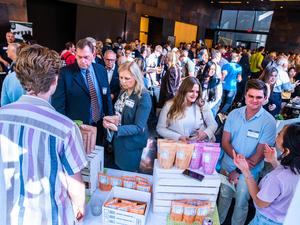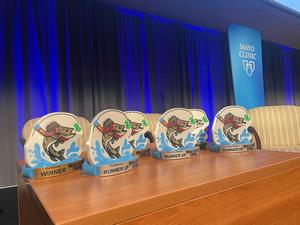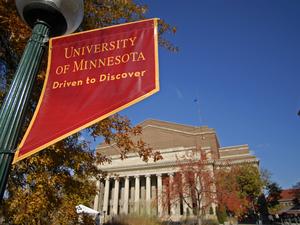While working at a florist in London 12 years ago, Dundee Butcher noticed the foam blocks the shop used to display flowers would pile up after being used, destined for the landfill.
She recalled asking, “Is this the best we can do?” It was, her manager responded, “But if you can come up with something, you will revolutionize the floral industry.”
So, Butcher set out to do that.
In 2015, with the help of the Center for Sustainable Polymers at the University of Minnesota, Butcher founded BKB Floral Foam Inc., a startup that develops foam blocks out of a bio-based material that can degrade. Eyeing market entrance next year, the Twin Cities startup looks to disrupt an estimated $500 million market for floral foam, a plastic product typically made from petroleum, a nonrenewable material.
BKB took home the first-place prize in the Minnesota Cup this fall, but the firm isn’t the only sustainable-materials startup tied to the CSP to find success and see significant market potential.
CSP’s focus area – using renewable resources to develop polymers, or plastics – is part of a burgeoning industry that includes major companies, like Wayzata-based Cargill Inc. and Maplewood’s 3M Co., and the interest of government entities, such as the U.S. Department of Defense.
And for those startups spinning out of CSP’s research, they’re already seeing direct interest in the form of inquiries and funding – even before hitting the market, their executives say.
“With climate change at such the forefront, they so want to be a part of sustainability,” Butcher said. “They want to be attached to what we're doing.”
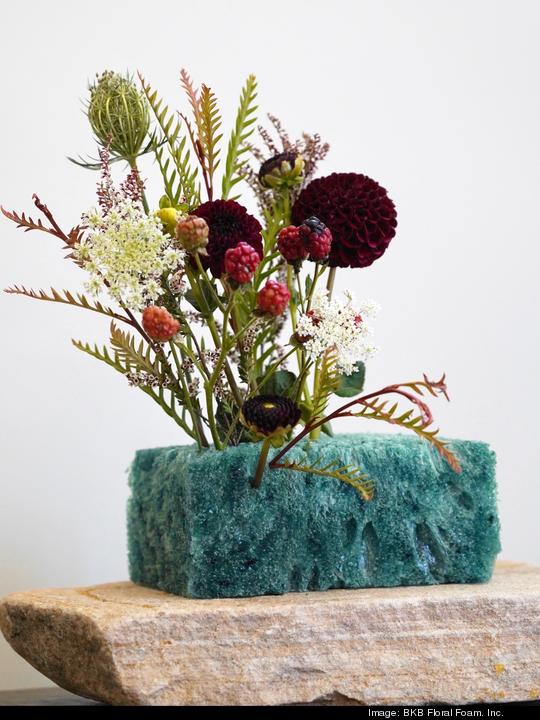
Efforts of the team to spin out startups
The University of Minnesota's Venture Center is also playing a role in birthing such startups. The Venture Center is part of the technology-commercialization office, which works to secure patents, license out the technology to existing companies and in some cases, launch a startup.
Since the Venture Center was founded in 2006, it has launched over 215 startups. Five of those have been based on research conducted at the CSP, which is funded by the National Science Foundation. The entity has dedicated over $40 million to CSP since 2011.
The CSP, headed by Director Marc Hillmyer, works to revolutionize how plastics are “made, unmade and remade” by using polymer science with a sustainable lens, the center says. Tackling the plastics industry that is largely petroleum-based, CSP develops new materials, chemical processes and technologies using renewable sources that can degrade in the environment. Polymers are made of repeating chains of large molecules that can create plastic products.
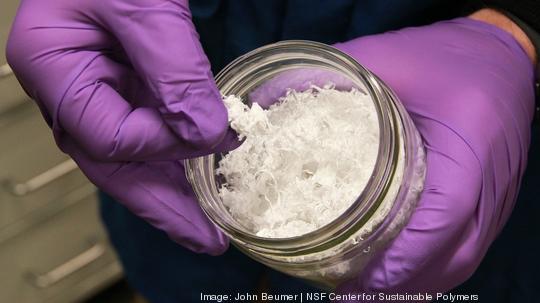
"We work on problems that are relevant to technologies that could be useful for society and [be] economically viable,” Hillmyer said. “We really do want to innovate in this space and make what we're doing realities for a positive impact on society, the environment and the economy.”
Making the technology a reality is where the Venture Center comes in, explained Russ Straate, the center's associate director.
“Our job is to take those inventions and work to translate them out into the market in some way ... for the benefit of the public, but also to create some economic value,” he said.
And for the sustainable technologies industry, “there's a lot more momentum now,” Straate added.
Increased interest
Startups rolling out of CSP report high interest in their technologies as they each head toward commercialization.
One of those startups is St. Louis Park-based Valerian Materials, which launched out of the Venture Center in 2016. The company uses a sugar-derived material to create a polymer that can be used to make products like foam. This fall, the company, alongside its project partners, received a $1.2 million federal grant, facilitated by a U.S. Department of Defense-sponsored manufacturing-innovation institute, St. Paul-based BioMADE.
Since the grant announcement, the company has seen heightened interest, particularly from large consumer-focused brands, CEO Mike Arbeiter said. "That is certainly exciting for us to see,” he said.
Heading toward commercialization near the second quarter of 2023, Valerian intends to focus on market segments where there is a desire by consumers for sustainability, like in the textiles and apparels industry, Arbeiter said.
Another startup, Chicago-based Lakril Technologies Corp., which spun out from the University of Minnesota last year, uses a chemical process to create acrylics from corn-derived lactic acid, which can be used for paints and coatings. It recently announced it secured $1.4 million in pre-seed funding from multiple corn-growing and research associations.
The interest so far, Lakril President Chris Nicholas said, is due to the push for low-carbon emissions from chemicals in the U.S. The company estimates a $10 billion global market opportunity in the field of acrylic acid and its derivatives.
“There is the opportunity to replace all of today's petrochemicals with sustainable, bio-based alternatives,” Nicholas said.
Lakril was co-founded by one of CSP’s senior investigators, Paul Dauenhauer, a MacArthur Fellow and university professor, who has been the brains behind several sustainable-focused startups.
The recent infusion of funds will help pay for the build-out of Lakril’s facility, focused on testing and scaling its technology prior to going to market by 2025, Nicholas said.
For BKB, florists and foam distributors across the country have shown interest in the company's product since it won the Minnesota Cup, securing the $50,000 grand prize. BKB moved into a more spacious research-and-development facility in Eden Prairie earlier this month to facilitate its next step: going to market mid-2023, said David Goldfeld, BKB’s chief technology officer who researched as a graduate student at CSP.
BKB is researching other applications for its product, like in the field of hydroponics – the method of growing plants without soil, the company says. The company expects to hit almost $50 million in annual revenue by 2027, Goldfeld said.
Minnesota’s role
There are also big players in the bio-based materials industry in Minnesota.
One is NatureWorks, a Plymouth-based company that makes a bio-based polymer called Ingeo. NatureWorks supplies part of its material to BKB, Goldfeld said.
A subsidiary of Cargill and a petrochemical company, NatureWorks sits on the CSP’s Industrial Advisory Board alongside notable companies like 3M and H.B. Fuller Co.
Several years ago, consumers, nonprofits and legislators began noticeably taking an interest in tackling climate change, and particularly, the role of plastics in it, said Leah Ford, senior global marketing and communications manager for NatureWorks. As a result, the company began seeing increased interest from large brands, like Starbucks and Pepsi, for its sustainable material.
“It's been a really exciting ride since then, not only to supply into those markets, but [to] try to figure out how do we take this [to a broader scale],” Ford said, noting that bio-based plastics are only expected to reach about 2% of the market share for all plastics by 2026.
However, that also means the potential for growth is tremendous, Ford said.
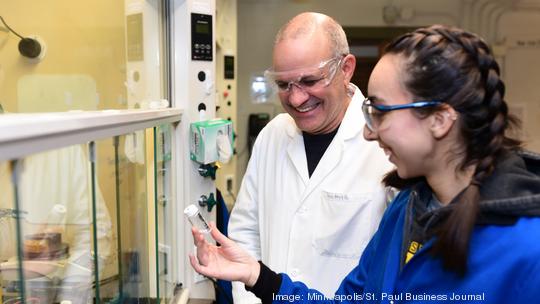
Indeed, Minnesota is uniquely positioned for such growth in the sustainable materials industry, as it has a strong innovation ecosystem surrounded by farming, said Doug Friedman, CEO of BioMADE. The DoD-sponsored institute works to help companies in the bio-manufacturing space "get over the valley of death to be able to scale their material to the point where it has a substantive market impact."
Cargill's business in this sector has also seen advancements, said Kurtis Miller, managing director for the company's bioindustrial business. His unit, which creates bio-based products like foams and flooring, has experienced an average of over 14% revenue growth every year for the past 20-plus years.
"It's a pretty exciting time to be in this space," he said.
While the interest is there, Hillmyer said he wants to see the ecosystem get even stronger in Minnesota. "I want to continue to ... bring more to the intersection of sustainable science and economics as we move forward in this space."
